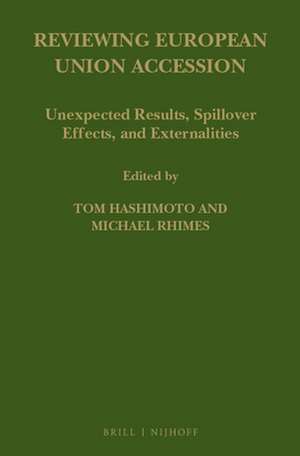Reviewing European Union Accession: Unexpected Results, Spillover Effects, and Externalities: Law in Eastern Europe, cartea 67
Editat de Tom Hashimoto, Michael Rhimesen Limba Engleză Hardback – 11 oct 2017
Din seria Law in Eastern Europe
- 18%
 Preț: 897.60 lei
Preț: 897.60 lei -
 Preț: 392.37 lei
Preț: 392.37 lei -
 Preț: 393.74 lei
Preț: 393.74 lei - 5%
 Preț: 794.15 lei
Preț: 794.15 lei -
 Preț: 394.51 lei
Preț: 394.51 lei - 18%
 Preț: 1269.11 lei
Preț: 1269.11 lei - 18%
 Preț: 1201.36 lei
Preț: 1201.36 lei - 18%
 Preț: 1200.60 lei
Preț: 1200.60 lei - 18%
 Preț: 873.41 lei
Preț: 873.41 lei - 18%
 Preț: 873.63 lei
Preț: 873.63 lei - 18%
 Preț: 1544.08 lei
Preț: 1544.08 lei - 18%
 Preț: 956.15 lei
Preț: 956.15 lei - 18%
 Preț: 889.09 lei
Preț: 889.09 lei - 18%
 Preț: 1168.15 lei
Preț: 1168.15 lei - 18%
 Preț: 946.55 lei
Preț: 946.55 lei - 18%
 Preț: 1079.53 lei
Preț: 1079.53 lei - 18%
 Preț: 1080.66 lei
Preț: 1080.66 lei - 18%
 Preț: 852.26 lei
Preț: 852.26 lei - 18%
 Preț: 749.09 lei
Preț: 749.09 lei - 18%
 Preț: 831.71 lei
Preț: 831.71 lei - 18%
 Preț: 675.73 lei
Preț: 675.73 lei - 18%
 Preț: 804.89 lei
Preț: 804.89 lei - 18%
 Preț: 743.91 lei
Preț: 743.91 lei - 18%
 Preț: 753.80 lei
Preț: 753.80 lei
Preț: 1089.97 lei
Preț vechi: 1329.24 lei
-18% Nou
Puncte Express: 1635
Preț estimativ în valută:
208.57€ • 223.03$ • 173.90£
208.57€ • 223.03$ • 173.90£
Carte indisponibilă temporar
Doresc să fiu notificat când acest titlu va fi disponibil:
Se trimite...
Preluare comenzi: 021 569.72.76
Specificații
ISBN-13: 9789004316478
ISBN-10: 9004316477
Dimensiuni: 155 x 235 mm
Greutate: 0 kg
Editura: Brill
Colecția Brill | Nijhoff
Seria Law in Eastern Europe
ISBN-10: 9004316477
Dimensiuni: 155 x 235 mm
Greutate: 0 kg
Editura: Brill
Colecția Brill | Nijhoff
Seria Law in Eastern Europe
Cuprins
List of IllustrationsNotes on ContributorsIntroduction: Reviewing 2014, Welcoming 2017, and Envisioning 2020Tom Hashimoto and Michael Rhimes
Part 1: Law – Developing Norms
1 Towards Adverse Spillover Effect? The Judicialization of the EU and the Changing Nature of Judicial Governance after EnlargementMariusz Jerzy Golecki2 Europeanization of the Hungarian Legal Order: From Convergence to Cancellation?Tamas Dezso Ziegler and Balázs Horváthy3 The Use of Referendum in Central and Eastern Europe after EU AccessionSergiu Gherghina4 Special Economic Zones in Poland: A Black Hole Swallowing State Budget or a Messiah for Regional Development?Hiroshi KanekoPart 2: Politics – Skepticism
5 (Dis)Trusting the European Union? On the Evolving Variety of Euroskepticism in Central and Eastern EuropeBoyka Stefanova6 Václav Klaus as a Driver of Czech EuroskepticismVratislav Havlík and Ondřej Mocek7 Poland and the Re-categorization of the Eurozone Entry: From a Legal Obligation to a Political IssueAnna Visvizi and Paweł TokarskiPart 3: Society – Education and Values
8 Emerging European Geographies: The Erasmus Program and Its Effect on the East–west Divide in Time of Economic CrisisAmelia Hadfield and Robert Summerby-Murray9 Slovenian Soft Power Capabilities in the European Context: Missed Opportunities of Cultural Diplomacy and Erasmus Student Exchange ProgramAna Bojinović Fenko and Jure Požgan10 The Harmonization of Laws on Same-Sex Unions in Post-Communist Post-Accession CountriesAlar KilpPart 4: EU Policy – From Within to Without
11 Poland and the Common Security and Defense Policy: Potential Leader 207?Laura Chappell12 Prague on a Mission: Emphasizing Democracy Promotion within EU Foreign PolicyMarek Neuman13 The Forgotten Chapter? Post-accession Development Policy of Central and Eastern EuropeSimon Lightfoot and Balázs Szent-Iványi14 Slovak Parliament’s Involvement in the EU Agenda: Kosovo’s Independence and the Policy of Non-RecognitionKatarína LezováPart 5: Russia – Beyond the EU
15 The European Union and Russia during the Two Waves of Enlargement: New Political and Implementation Rationales on Old IssuesSandra Fernandes16 EU-Russia Cooperation on Energy Efficiency: An Unexpected Benefit of Regional Interdependence between Russia and the CEE Member States?Olga Khrushcheva17 The European Union’s Influence over Media Discourse on Renewable Energy Sources in RussiaMarianna PoberezhskayaIndexNotă biografică
Tom Hashimoto, LL.M., FHEA, is Director of MSc in Financial Economics program at ISM University of Management and Economics, Lecturer at Vistula University, and Teaching Fellow in Political Economy at the OSCE Academy. He is a recipient of Career Integration Fellowship from CERGE-EI, and is DPhil Candidate in Financial Geography at the University of Oxford.
Michael Rhimes, LLB (Hons) (Lond), BCL (Oxon) is Fourth référendaire to Judge Christopher Vajda, Court of Justice of the European Union, Luxembourg. He has wide interests in the law, having previously published on trade defense measures and standing under EU law.
Michael Rhimes, LLB (Hons) (Lond), BCL (Oxon) is Fourth référendaire to Judge Christopher Vajda, Court of Justice of the European Union, Luxembourg. He has wide interests in the law, having previously published on trade defense measures and standing under EU law.
